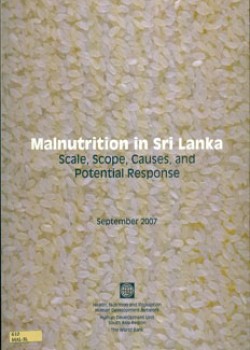
Malnutrition in Sri Lanka
Scale, Scope, Causes and Potential Response
Publisher: The World Bank (WB)
Place of Publish: USA, Washington D.C.
Year: 2007
Page Numbers: 123
Acc. No: 3166
Class No: 610 MAL-SL
Category: Books & Reports
Subjects: Health
Type of Resource: Monograph
Languages: English
ISBN: 978-955-8909-29-7
The Millennium Development Goals (MDGs) are a set of eight goals that United Nations member countries are committed to reach by 2015. The first MDG is to eradicate poverty and hunger. This report focuses on the attainment of human development-related MDGs by sub-national units in Sri Lanka relating to poor and integrating nutrition with other sectoral activities, including health, agriculture, education, economic reform and rural development. It primarily focuses on developing a programmatic framework for the health sector. Malnutrition includes both under-nutrition and overweight. Overweight predisposes the population to higher risks of cardiovascular diseases, diabetes, and other non-communicable diseases (NCDs). Even with relatively optimistic assumptions about economic growth, it alone is insufficient to meet the MDGs. The Government of Sri Lanka,s (GOSL,S) current policy response to malnutrition consists of three broad strategies: direct food assistance programmes, poverty reduction programmes and the provision of an integrated package of maternal and child health and nutrition services through the Ministry of Healthcare and Nutrition. Complementary strategies to reduce poverty or to improve access to safe water and sanitation must be specifically designed to reduce inequalities. GOSL and the World Bank both recognize the need to address malnutrition. Sri Lanka needs to focus on three key changes to appropriately address malnutrition: (a) finance a technically correct set of strategies and interventions in an economically justifiable formulation to maximize cost-effectiveness, (b) ensure a high level of political commitment to sustain these actions and (c) identify the appropriate institutional arrangements and develop necessary capacities in these institutions. This report seeks to assist the GOSL in two ways: 1) by providing evidence-based nutrition analysis to incorporate into the design of a new national programmatic framework, and 2) by enhancing current investments in the country by providing information on the dimensions, costs and causes of under-nutrition and examining the effectiveness of existing policies.



